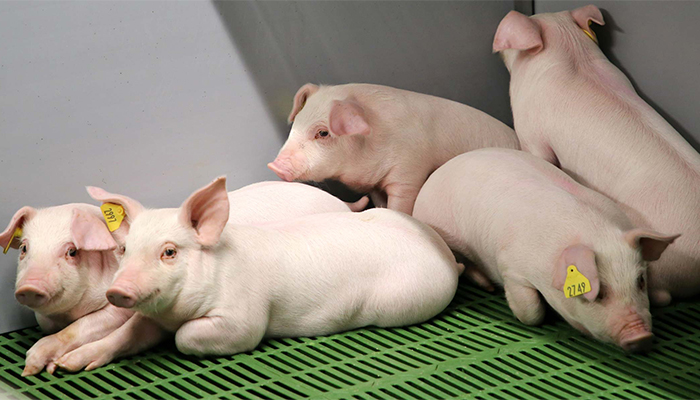23 February 2024
Water disinfection by chlorination

Clean drinking water is essential for the growth and development of pigs and as such, plays a key role in animal performance, writes Emer McCrum.
The provision of clean drinking water is therefore essential to support all stages and ages of pigs. Younger animals in particular however are very vulnerable to developing problems in response to poor water quality which can lead to can lead to illness, suboptimal performance and even mortality. Good quality water is recognised as an indispensable element for a smooth transition post weaning particularly if problems with diarrhoea exist on a unit. This is especially important as we adjust to weaning pigs in the absence of Zinc Oxide (ZnO).
At a conference I attended last year, producers in the audience were asked whether they would be happy to prepare a newborn baby’s bottle using the water currently plumbed into their first stage weaner houses. While this sounds extreme, it highlights how imperative it is to ensure good quality drinking water is provided to our most vulnerable nursery pigs. As we are all aware, there is no single solution to mitigate the impact of removing ZnO and the transition requires an all-encompassing approach focused on nutrition, health, hygiene, housing and management. Water hygiene as part of this has come into sharp focus.
While most units routinely carry out water sampling as part of quality assurance, it is recommended to carry out a more thorough assessment of water hygiene across the unit. This can be done by sampling at the closest point to where the water supply enters the unit and at the end of the line. This allows for an accurate assessment of both the supply and the water delivery infrastructure throughout the farm. We cannot rely on the quality of the source water alone because of the risk of biofilms. Biofilms can cause benign problems such as persistent blocking of water systems but more worryingly, can pose a serious risk to pig health. Research has shown biofilms can cause the persistence of infections in houses and systems, and can have a direct role in pig disease.
There are many effective water treatment options on the market suitable for installation on pig units. One of the simplest and most cost effective is chlorinating the water supply. Chlorination is the process of adding chlorine to drinking water to kill parasites, bacteria, and viruses. This ensures pigs have continued access to clean drinking water in addition to a guarantee that the plumbing infrastructure throughout the farm is clean and maintained. Dosing pump systems or in-line options are currently available to chlorinate water. Both are proven very effective and have comparably low running costs relative to the benefits in terms of improved performance and health. The average cost of chlorination is approximately 20% of the running cost of acid.
Dosing pump systems
The process where liquid chlorine is continuously dosed into the water via an electronic precision dosing pump. At setup a quick calculation is done to determine the correct dosage rate. It is very important to note that where water treatment systems are used and chlorine solutions must be handled, extreme care should be taken and appropriate PPE worn at all times. Hypochlorite can cause severe burns in the case of direct contact and the vapour released can cause damage to respiratory passages. For this reason PPE including chemical splash goggles, chemical resistant gloves, a respirator and protective clothing must be worn.
In line systems
Also called passive chlorination, the process where chlorine is delivered via a device installed into a section of pipework. The water is then automatically chlorinated as it passes through the device. Dosing devices contain either a solid tablet or granular chlorine and do not require electricity or any moving parts. While this system is typically more expensive versus dosing pumps, it is safer as there is no requirement to handle hazardous chemicals and overall requires less input.
Water is often referred to as the forgotten nutrient however an absence of clean drinking water can undermine hard work and attention to detail in other areas. Irish companies are currently supplying both dosing pumps and in line systems to disinfect water. Alternatively if it is not possible or feasible to treat the entire water supply at present, starting off with the most vulnerable pigs is recommended and either system can be retrofitted for this purpose. Some in line systems include devices that can be fitted into header tanks to treat water in individual sections or rooms. In addition to water hygiene it is also recommended to regularly review the quality of your water supply across physical and mineral parameters.
